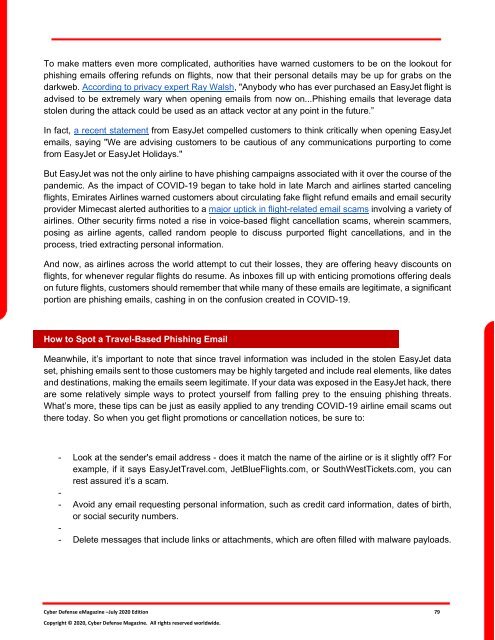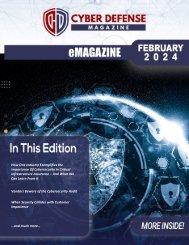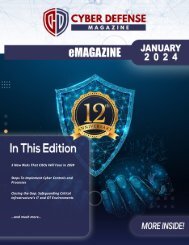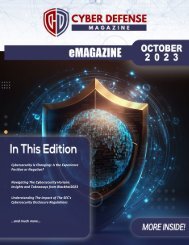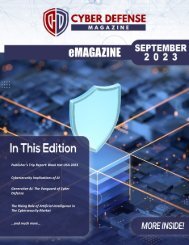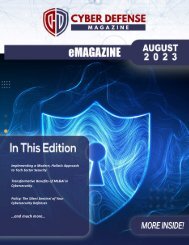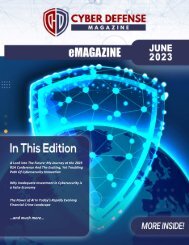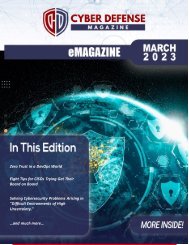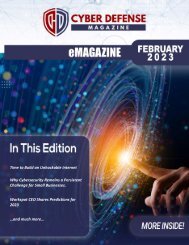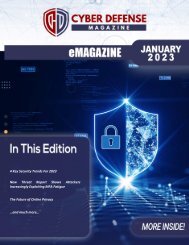Cyber Defense eMagazine July 2020 Edition
Cyber Defense eMagazine July Edition for 2020 #CDM #CYBERDEFENSEMAG @CyberDefenseMag by @Miliefsky a world-renowned cyber security expert and the Publisher of Cyber Defense Magazine as part of the Cyber Defense Media Group as well as Yan Ross, US Editor-in-Chief, Pieruligi Paganini, Co-founder & International Editor-in-Chief, Stevin Miliefsky, President and many more writers, partners and supporters who make this an awesome publication! Thank you all and to our readers! OSINT ROCKS! #CDM #CDMG #OSINT #CYBERSECURITY #INFOSEC #BEST #PRACTICES #TIPS #TECHNIQUES
Cyber Defense eMagazine July Edition for 2020 #CDM #CYBERDEFENSEMAG @CyberDefenseMag by @Miliefsky a world-renowned cyber security expert and the Publisher of Cyber Defense Magazine as part of the Cyber Defense Media Group as well as Yan Ross, US Editor-in-Chief, Pieruligi Paganini, Co-founder & International Editor-in-Chief, Stevin Miliefsky, President and many more writers, partners and supporters who make this an awesome publication! Thank you all and to our readers! OSINT ROCKS! #CDM #CDMG #OSINT #CYBERSECURITY #INFOSEC #BEST #PRACTICES #TIPS #TECHNIQUES
Create successful ePaper yourself
Turn your PDF publications into a flip-book with our unique Google optimized e-Paper software.
To make matters even more complicated, authorities have warned customers to be on the lookout for<br />
phishing emails offering refunds on flights, now that their personal details may be up for grabs on the<br />
darkweb. According to privacy expert Ray Walsh, "Anybody who has ever purchased an EasyJet flight is<br />
advised to be extremely wary when opening emails from now on...Phishing emails that leverage data<br />
stolen during the attack could be used as an attack vector at any point in the future.”<br />
In fact, a recent statement from EasyJet compelled customers to think critically when opening EasyJet<br />
emails, saying "We are advising customers to be cautious of any communications purporting to come<br />
from EasyJet or EasyJet Holidays."<br />
But EasyJet was not the only airline to have phishing campaigns associated with it over the course of the<br />
pandemic. As the impact of COVID-19 began to take hold in late March and airlines started canceling<br />
flights, Emirates Airlines warned customers about circulating fake flight refund emails and email security<br />
provider Mimecast alerted authorities to a major uptick in flight-related email scams involving a variety of<br />
airlines. Other security firms noted a rise in voice-based flight cancellation scams, wherein scammers,<br />
posing as airline agents, called random people to discuss purported flight cancellations, and in the<br />
process, tried extracting personal information.<br />
And now, as airlines across the world attempt to cut their losses, they are offering heavy discounts on<br />
flights, for whenever regular flights do resume. As inboxes fill up with enticing promotions offering deals<br />
on future flights, customers should remember that while many of these emails are legitimate, a significant<br />
portion are phishing emails, cashing in on the confusion created in COVID-19.<br />
How to Spot a Travel-Based Phishing Email<br />
Meanwhile, it’s important to note that since travel information was included in the stolen EasyJet data<br />
set, phishing emails sent to those customers may be highly targeted and include real elements, like dates<br />
and destinations, making the emails seem legitimate. If your data was exposed in the EasyJet hack, there<br />
are some relatively simple ways to protect yourself from falling prey to the ensuing phishing threats.<br />
What’s more, these tips can be just as easily applied to any trending COVID-19 airline email scams out<br />
there today. So when you get flight promotions or cancellation notices, be sure to:<br />
- Look at the sender's email address - does it match the name of the airline or is it slightly off? For<br />
example, if it says EasyJetTravel.com, JetBlueFlights.com, or SouthWestTickets.com, you can<br />
rest assured it’s a scam.<br />
-<br />
- Avoid any email requesting personal information, such as credit card information, dates of birth,<br />
or social security numbers.<br />
-<br />
- Delete messages that include links or attachments, which are often filled with malware payloads.<br />
<strong>Cyber</strong> <strong>Defense</strong> <strong>eMagazine</strong> –<strong>July</strong> <strong>2020</strong> <strong>Edition</strong> 79<br />
Copyright © <strong>2020</strong>, <strong>Cyber</strong> <strong>Defense</strong> Magazine. All rights reserved worldwide.


